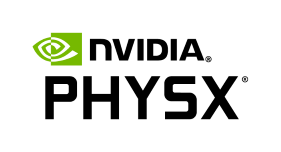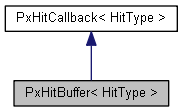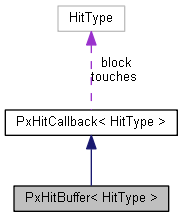Returns scene query hits (intersections) to the user in a preallocated buffer.
More...
#include <PxQueryReport.h>
template<typename HitType>
struct PxHitBuffer< HitType >
Returns scene query hits (intersections) to the user in a preallocated buffer.
Will clip touch hits to maximum buffer capacity. When clipped, an arbitrary subset of touching hits will be discarded. Overflow does not trigger warnings or errors. block and hasBlock will be valid in finalizeQuery callback and after query completion. Touching hits are guaranteed to have closer or same distance ( <= condition) as the globally nearest blocking hit at the time any processTouches() callback is issued.
- Note
- Pre-made typedef shorthands, such as PxRaycastBuffer can be used for raycast, overlap and sweep queries.
- See also
- PxHitCallback
-
PxRaycastBuffer PxOverlapBuffer PxSweepBuffer PxRaycastBufferN PxOverlapBufferN PxSweepBufferN
◆ PxHitBuffer()
template<typename HitType>
Initializes the buffer with user memory.
The buffer is initialized with 0 touch hits by default => query will only report a single closest blocking hit. Use PxQueryFlag::eANY_HIT to tell the query to abort and return any first hit encoutered as blocking.
- Parameters
-
| [in] | aTouches | Optional buffer for recording PxQueryHitType::eTOUCH type hits. |
| [in] | aMaxNbTouches | Size of touch buffer. |
- See also
- PxHitCallback
◆ ~PxHitBuffer()
template<typename HitType>
◆ getAnyHit()
template<typename HitType>
Convenience iterator used to access any hits in this result, blocking or touching.
◆ getMaxNbTouches()
template<typename HitType>
◆ getNbAnyHits()
template<typename HitType>
Computes the number of any hits in this result, blocking or touching.
◆ getNbTouches()
template<typename HitType>
◆ getTouch()
template<typename HitType>
◆ getTouches()
template<typename HitType>
◆ processTouches()
template<typename HitType>
virtual callback function used to communicate query results to the user.
This callback will always be invoked with touches as a buffer if touches was specified as non-NULL. All reported touch hits are guaranteed to be closer than the closest blocking hit.
- Parameters
-
| [in] | buffer | Callback will report touch hits to the user in this buffer. This pointer will be the same as touches. |
| [in] | nbHits | Number of touch hits reported in buffer. This number will not exceed maxNbTouches. |
- Note
- There is a significant performance penalty in case multiple touch callbacks are issued (up to 2x)
-
to avoid the penalty use a bigger buffer so that all touching hits can be reported in a single buffer.
-
If true (again) is returned from the callback, nbTouches will be reset to 0,
-
If false is returned, nbTouched will remain unchanged.
-
By the time processTouches is first called, the globally closest blocking hit is already determined,
-
values of hasBlock and block are final and all touch hits are guaranteed to be closer than the blocking hit.
-
touches and maxNbTouches can be modified inside of processTouches callback.
- Returns
- true to continue receiving callbacks in case there are more hits or false to stop.
- See also
- PxAgain PxRaycastHit PxSweepHit PxOverlapHit
Implements PxHitCallback< HitType >.
The documentation for this struct was generated from the following file:




 Public Member Functions inherited from PxHitCallback< HitType >
Public Member Functions inherited from PxHitCallback< HitType > Public Attributes inherited from PxHitCallback< HitType >
Public Attributes inherited from PxHitCallback< HitType >